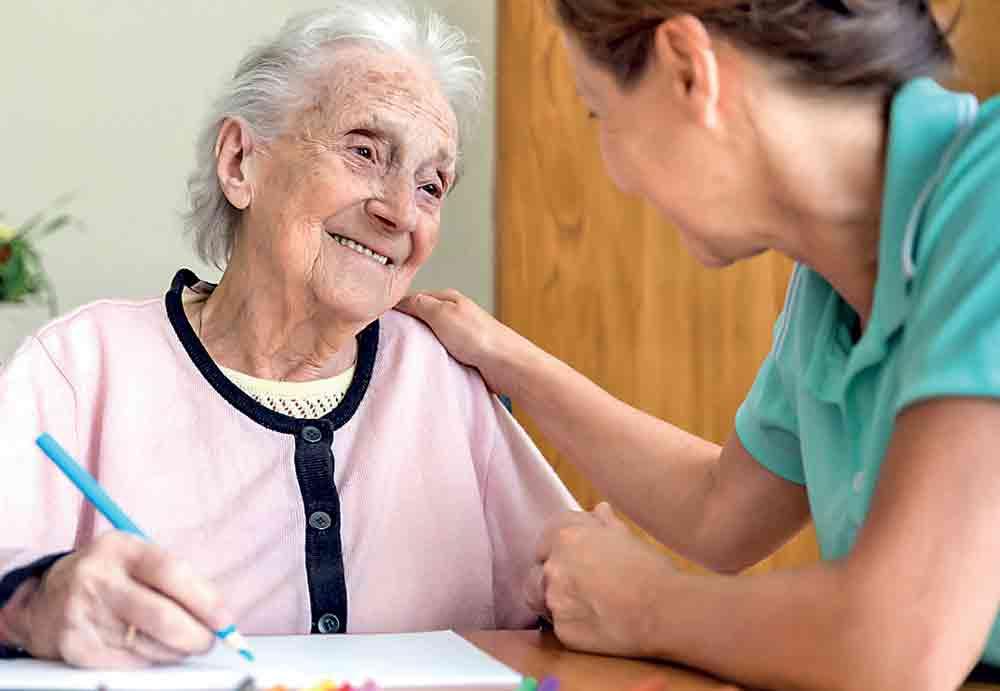In Partnership with the Lanka Alzheimer’s Foundation to Mark World Alzheimer’s Month
What is dementia?
Dementia is not a normal part of ageing, but is caused by damage to and loss of nerve cells and their connection to the brain that worsen over time due to a number of factors. This affects how people think, communicate, remember, plan and carry out everyday tasks. This may be accompanied or preceded by changes in mood, motivation and behaviour. The commonest cause of dementia is Alzheimer’s disease and it affects two thirds of all people with dementia. There are other forms of dementia such as vascular dementia, frontotemporal dementia, Lewy body dementia and many more. Dementia affects each person in a different way depending on the underlying causes, person’s overall health condition and the persons’ cognitive abilities before getting dementia. Women are disproportionately affected by dementia, both directly and indirectly. While more women than men are likely to get dementia, they also provide 70% of care to people living with dementia. Dementia has no cure at present and medicines can treat symptoms in the short term.
Age is one of the biggest risk factors for dementia. While it generally affects older people, not all people will get dementia as they age. The likelihood of dementia increases over time with about 5% of those over 65 years experiencing it to about 20% experiencing it by the age of 80
Who can it affect?
Age is one of the biggest risk factors for dementia. While it generally affects older people, not all people will get dementia as they age. The likelihood of dementia increases over time with about 5% of those over 65 years experiencing it to about 20% experiencing it by the age of 80. By the age of 90, which many people live up to nowadays due to better health care, the chances of developing dementia are 1 in 3. Genes too can increase the risk of developing dementia but overall, only a tiny proportion, of all cases of dementia result from genetic expression.

How to prevent or delay the onset of dementia?
While age and genes are non-modifiable risk factors, there are modifiable risk factors which research suggests could prevent or delay the onset of dementia by 45%. Modifiable risk factors focus on healthy lifestyle choices and public health interventions. Healthy life style choices include a healthy diet, physical activity, managing conditions such as obesity, hypertension and diabetes, avoid smoking and excessive alcohol consumption, staying socially engaged and challenging your brain through mentally stimulating activities. Public health measures include bans on smoking in public places, compulsory child education etc.
What are the early signs and symptoms of dementia?
Early detection of dementia can help affected persons to plan their future, access proper care and support that can improve his or her quality of life. Recognizing the early warning signs of dementia is therefore crucial.
- Memory loss (recent memory)
- Losing or misplacing things
- Getting lost or confused in familiar places
- Losing track of time
- Difficulty solving problems or making decisions
- Problem following conversations and trouble finding words
- Difficulty in performing familiar tasks
- Misjudging distances to objects visually
- Poor or decreased judgement
- Changes in mood and behavior
- Withdrawal from work or social activities

It is however important to remember that these are warning signs and that there may be other conditions that can cause similar symptoms. Therefore, it is important that a medical professional be consulted for a diagnosis.
What is the situation in Sri Lanka?
It is estimated that there are over 200,000 persons currently living with dementia and by 2050, it is projected to rise to 460, 000 persons. However, considering the rapid increase in prevalence globally, it is believed that the actual numbers are much higher. While quality research is needed, it is pertinent to note that by 2030, 1 in 5 will be over 60 years of age in Sri Lanka.
It is estimated that there are over 200,000 persons currently living with dementia and by 2050, it is projected to rise to 460, 000 persons.
Why is awareness about dementia important?
Awareness is important as it promotes early diagnosis, helps reduce stigma and fosters empathy. Awareness also equips persons and communities with knowledge and understanding to help support those affected to live an improved quality of life.












